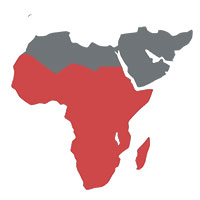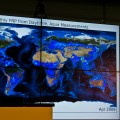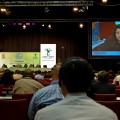GCF: The hostage or the hero of Durban?
Tim Hall | November 30, 2011.
Today the Green Climate Fund makes its highly anticipated arrival at COP17. All year the financing issues begun at the 2009 Copenhagen COP15 have been a hot talking point. So what’s all the fuss about?
Currently, the GCF is being held hostage as a bargaining chip to force a Durban package which suits certain interests, namely those that involves no Kyoto Protocol second commitment period. Today delegates will let the world know how serious they are about assisting developing nations in a changed climate.
Proposed at Copenhagen, the GCF is intended as the operating entity of the financial mechanism to “support projects, programme, policies and other activities in developing countries related to mitigation”. The goal was $100 billion per year by 2020, to be raised from a “wide variety of sources”.
After a 40 member Transitional Committee was appointed as part of the Cancun Agreements, work began immediately and four sessions were held over the last eight months.
It was hoped the committee would be finalised and agree on the design and structure of GCF so work could begin on fund structure at Durban COP17.
Unfortunately, this was not to be. The main opposition came from the USA (over legal status of GCF, relationship to COP, and role of private sector) and Saudi Arabia (over role of private sector and decision making procedures over the board). But there were also developing countries that were unhappy, such as the eight ALBA countries ( a small coalition of Latin American socialist states) and Egypt.
Due to these objections, the Committee could not fulfil its task of adopting a report by consensus which goes to COP for approval. Instead, it only “considered” the report, meaning it will be sent to COP and the contentious issues will have to be negotiated again. This makes it unlikely that the GCF will start in 2012.
This is counter to what would be best for developing nations, who are already in desperate need for money in the pot to curb emissions and adapt to changes. Developing countries further argue that the COP should serve as the supervisory body, rather than its current proposed form as a advisory body—due to the strength in numbers of the G77 at COP compared to the GCF Board. They also argue for grants instead of loans, to avoid additional debt, and are critical of the decision to appoint the World Bank as trustee of the funds, however pleased at the three year review of the trusteeship.
Rumours at the negotiations are that the US will not block the presentation of the Transitional Committee’s report to the COP; however this means their and others concerns with the GCF as it stands will be voiced at the COP, potentially opening the dispute up to all nations.
By opening it up at the COP, the GCF may find itself delayed for another year.
As Liane Schalatek argues, a best case scenario could involve the fund being operational by next year, with current GCF governance being approved provisionally, while matters of procedure and guidelines continue to be developed.
Practical problems also arise for developed nations, who must provide the funds to meet the commitment. One suggestion pushed by Oxfam and the WWF is a international carbon price on international shipping, which they estimate could provide up to $10billion per year. Other suggestions include Robin Hood taxes and Tobin taxes.
Meanwhile, Climate Action Network (CAN) argues that what needs to be done at Durban is key decisions on the nature and the form of the GCF, and ensure dedicated funding windows are established for specific funding areas, such as adaptation and mitigation. They’re also pushing for adequate finance from 2013 onwards, including specific commitments for sources of finance 2013-2015, and want thorough transparency and civil society participation.
Whatever happens today, the GCF will make for an interesting COP, one hopefully remembered for success. Durban cannot be defined by delay.













comment